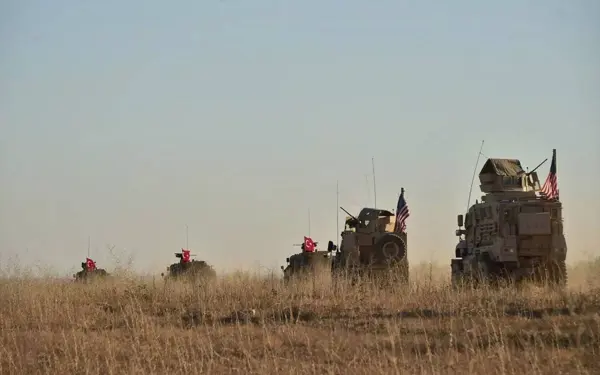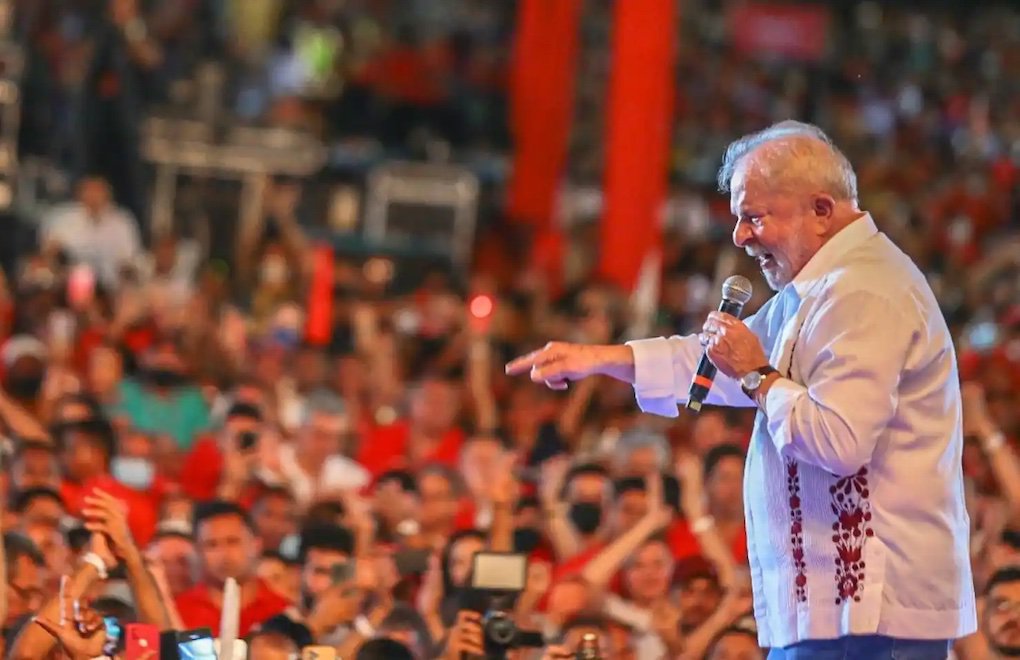Still defending Turkish military cooperation in the USA's prospective war on Iraq, vis-a-vis great public opposition and the parliament's refusal, "I warn them (Kurds of Iraq) of our legitimate rights and advise to remain balanced and cooperative," General Hilmi Ozkok, Turkish Chief of Staff told journalists in a Wednesday public statement.
Northern Iraqi Kurdish towns recently witnessed angry popular protests against prospective Turkish military intervention in the area as envisaged in the wake of a US attack on Iraq. In turn, media coverage of Turkish flags burnt by angry Kurds arouses public resentment on the Turkish side of the border, in spite of later apologies by Iraqi Kurdish leaders.
A prospective Kurdish-Turkish conflict in Northern Iraq gains further import as General Ozkok's plain statement underlines the "inevitability" of Turkey's military involvement in the US war on Iraq.
"Unfortunately we are left to choose between worse and worst, not between good and bad," Ozkok says. "If we would remain fully uninvolved in the war we will be faced with the same losses, should we have been involved but would have remained without any say on the post-war situation and on compensation of our losses from the war. However if we would support the warring party we might be able to compensate some of our losses and provide humanitarian assistance for refugees in Northern Iraq without being involved in actual war."
"I wish that the non-involvement option adopted by us (the parliament) might not oblige us to take action against the warring parties."
Ironically, vast US military mobilization is reported on Thursday, immediately after Ozkok's statement, in the southern Mediterranean ports of Iskenderun and Mersin and in the near-border towns of Silopi and Mardin, albeit parliament's refusal to allow "presence of foreign troops in the country". US military convoys, after a week's halt, are reported to resume transportation of personnel, vehicles and supplies disembarked from cargo ships.
Analysing Ozkok's statement, Yavuz Onen, Human Rights Foundation (IHV) relates General Ozkok's statement to intentions of moving a second motion soon.
"In legal terms Turkey is under US occupation as the US military presence is devoid of any framework according to Turkish law," Onen told IPS. "The US troops notwithstanding contrary parliament decision hires land in southeast Mardin for one year."
"These are signs that the government will move another motion to the parliament in order to adjust the de facto situation into a legal framework."
Pro-Kurdish HADEP (People's Democracy Party) Secretary General Hayri Ates too is unhappy with Ozkok's stand: "Chief of Staff's position is far from public expectations. Considering the heavy losses from the 15 years of conflict in southeast Turkey, we are against any military intervention in Northern Iraq."
However, Ismet Berkan, editor of Istanbul daily "Radikal" recalls that the Turkish parliament has refused not only the deployment in Turkey and transferring into Iraq of US troops but also the presence of Turkish troops in Iraq. "Accordingly the Turkish troops presently deployed in Northern Iraq should have been withdrawn as soon as possible."
"Or", Berkan adds, "the present Turkish military presence there, justified with providing humanitarian assistance, should be reinforced in order to protect Iraqi Kurds from Saddam regime." However Berkan is of the opinion that "this option might incite reactions from Kurds and even from the US, that is the risk referred by Gen. Ozkok."
Yet, Kurdish critics here are hardly convinced with General Ozkök's calculated reasoning what deliberately leaves out previously posed Turkish strategic concerns such as prospective Kurdish independence from Iraq, the future of oil rich Northern Iraqi areas of Mousul and Qirquk as well as the status of pro-Ankara Turkoman minority, mostly inhabited around Qirquk.
Former prime Minister Bulent Ecevit during his visit to Washington last year has clearly expressed that Ankara is more concerned with preserving Iraq's territorial integrity and borders than it is with the survival or downfall of Saddam Hussein's regime. Turkey worries that any US operation against Saddam could encourage uprisings in the mostly Kurdish northern areas of Iraq bordering Turkey, and prompt the formation of a Kurdish state in that region. Such an event could pose a serious threat to Turkey's unity by provoking Turkish Kurds to rebel for greater autonomy in the Kurdish-dominated southeast, bordering Iraq, Turkish officials believe.
Fifteen years of internal conflict with the insurgent Kurdish guerrillas of the Kurdistan Workers Party (PKK) has left the Turkish government cautious about the possible birth of a Kurdish state in northern Iraq. Ankara remains highly skeptical that Iraq can maintain its territorial integrity should the Saddam regime collapse under prospective US strikes.
On the other hand, Kurdish critics in Turkey point out that Iraq "hardly preserves any of its territorial integrity as Turkish troops frequently launch cross-border operations and strike Northern Iraq in countless air raids," according to one leading Kurdish intellectual, Umit Firat. "Turkey indeed fears the replacement of Saddam Hussein by a democratic regime that could grant northern Iraqi Kurds broader freedom, and in turn present a legitimate model for Turkey's Kurds."
Firat relates the recent Kurdish resentment in Northern Iraq with the general public resentment from foreign military presence anywhere else in the world. "Turkish army is no exception. Iraqi Kurds should not be expected to welcome them with flowers," he told IPS.
Divided into four parts after the collapse of the Ottoman Empire, the region is home to 12 million former Ottoman Kurds, now mostly living in southeastern Turkey. An additional two million Kurds live in northern Iraq, one million in Iran and fewer than one million in Syria.
Despite deep concerns over Iraq's territorial disintegration, Ankara has reportedly considered a multi-ethnic equation for northern Iraq in which the Turkoman population would become part of an autonomous administration, if the present status quo were suddenly destroyed. In Ankara's view, such an approach would safeguard Turkey's greater influence in the region in the aftermath of a collapsed Saddam regime.
Firat also believes that "Turkey makes a mistake in playing the Turkoman card."
"Ankara inevitably leads to conflict and competition between the Kurds and Turkomans who have been co-existing in the area for decades without significant conflict," he told. However Firat is of the opinion that the US war on Iraq might generate improved political and economical conditions for Northern Iraqi Kurds if Turkey's non-involvement is secured.
Nevertheless Kurdish inhabitants of southeast city of Diyarbakir are happy with the parliament's non-involvement stand.
"The parliament has given an example of honorable politics last week," says Hikmet Baran, a Kurdish businessman. "Perhaps the economy will go for worse, but Turkey will be able to find a radical way out only when we meet the worst," he told IPS.
Sefik Turk, mayor of Carikli district, Diyarbakir, reacts the US pressure for Turkish involvement in the war: "They threaten us with would be financial crisis. We are living through a crisis for a decade or more we are used to that," he told IPS. "I prefer crisis to bloodshed."
Mehmet Mumcuoğlu, a shoe storeowner complains from the stagnation. "I have not been able to sell a pair of shoes in one week," he told IPS. "The fear of war prevents people from spending."
"Even the rumors of war have finished-off us. Imagine what happens when it actually begins."
Meanwhile Washington based international rights monitoring group Human Rights Watch has raised concerns for a Turkish military intervention in Northern Iraq.
"The record of the Turkish military in combating Kurdish rebels at home raises serious concerns about its engagement in northern Iraq during or after any war", Human Rights Watch warns in Wednesday public statement.
The Human Rights Watch briefing paper, "Turkey and War in Iraq: Avoiding Past Patterns of Violation," recounts instances in which Turkish forces have violated international humanitarian law in past operations that took them over the border into northern Iraq.
"If Turkish operations in Northern Iraq bear any resemblance to those in southeastern Turkey, we can expect to see a human rights disaster," said Elizabeth Andersen, executive director of the Europe and Central Asia division of Human Rights Watch
"The best bet against a repeat performance would be to keep past abusers out of northern Iraq, and to make sure civilian monitors are on the ground to observe the military's conduct." (NM/EK)










